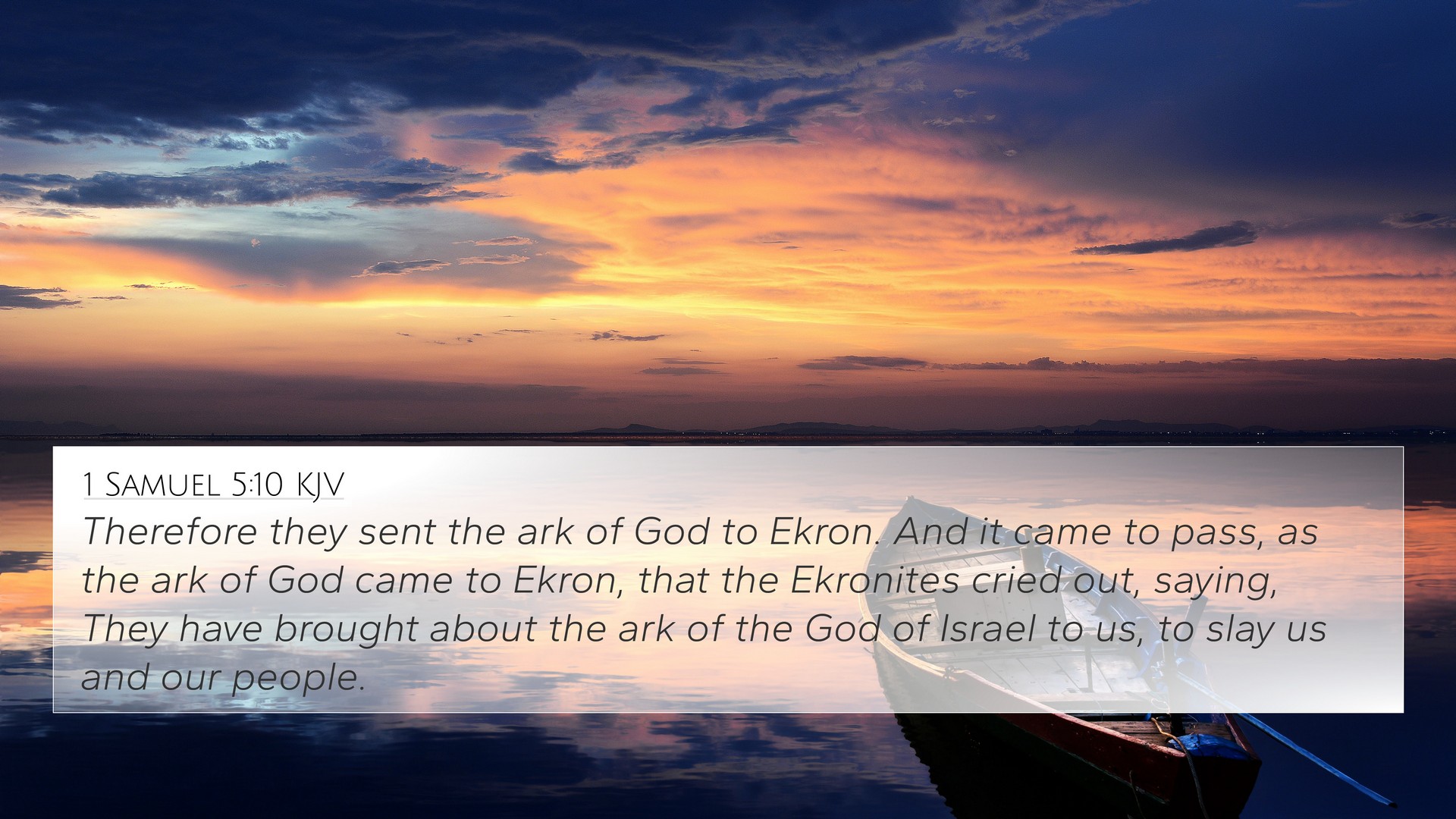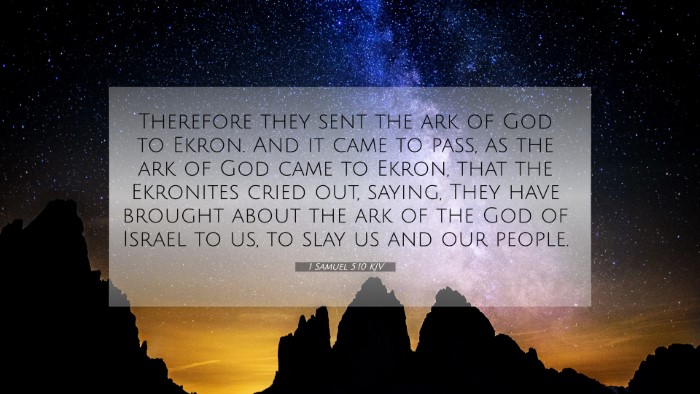Understanding 1 Samuel 5:10
1 Samuel 5:10 reads: "So they sent the ark of God to Ekron. And as the ark of God came to Ekron, the Ekronites cried out, saying, 'They have brought the ark of the God of Israel to us, to kill us and our people!'"
This verse captures the reaction of the Philistines upon receiving the Ark of the Covenant. It signifies their fear and misunderstanding of the true nature of God and His presence.
Summary of Interpretations
The interpretation of this verse can be enriched by insights from various public domain commentaries.
Commentary Insights
-
Matthew Henry:
Henry notes that the Philistines' fear reflects a misunderstanding of the Ark's power. They recognized it as a vessel of divine judgment rather than a source of blessing. This misinterpretation points to a significant theme in the Bible about the nature of God’s presence and its effects on those who do not know Him.
-
Albert Barnes:
Barnes highlights that the Philistines, having had previous experiences with the Israelites that resulted in defeat, were terrified at the arrival of the Ark. Their belief that the Ark would bring disaster underscores a recurrent biblical lesson about the consequences of defying God and the reverence due to His holiness.
-
Adam Clarke:
Clarke suggests that the fear expressed by the Ekronites is indicative of their polytheistic beliefs and how they perceived the power of Israel's God. The mention of killing reveals their realization of being in the presence of a holy artifact, which they considered a threat due to their past encounters with Israel.
Bible Cross-References
Several other Bible verses resonate with the themes found in 1 Samuel 5:10, establishing strong connections and prompting comparative analysis:
- 1 Samuel 4:3-4: The initial taking of the Ark into battle and its implications.
- 1 Samuel 6:1-2: The Philistines returning the Ark due to the plagues they suffered.
- Exodus 25:22: The significance of the Ark as the dwelling place of God among His people.
- Numbers 10:35: The ominous presence associated with the Ark as it leads the Israelites.
- Psalms 68:1-2: The concept of God rising and scattering His enemies, reflecting His might.
- Deuteronomy 7:2: God's power over nations, analogous to His relationship with His people.
- 1 Chronicles 13:10-13: The repercussions of disrespecting the Ark, similar to the Philistine experience.
- Hebrews 9:4: Reference to the contents of the Ark, enhancing understanding of its significance.
- John 1:11-12: Connecting themes of rejection and acknowledgment of divine authority, paralleling the Philistines’ rejection.
- Revelation 11:19: The eventual restoration and reverence for God's presence as indicated by the Ark.
Thematic Connections
The context of 1 Samuel 5:10 opens up opportunities for thematic connections between various scriptures:
-
The Power of God: Reflecting on how the Philistines reacted similarly to other nations before Israel, showing that God's power instills fear in the hearts of those who are not His people.
-
Divine Judgment: Understanding that the arrival of the Ark often signifies judgment, as echoed in other stories, such as the plagues in Egypt.
-
Fear of the Lord: Linking with Proverbs 1:7, where the fear of the Lord is the beginning of knowledge, echoing the Philistines' fear and misunderstanding.
-
Respect for Holy Things: The necessity of reverence and respect towards God’s artifacts, paralleling New Testament teachings about the sanctity of the Holy Spirit.
Conclusion
In conclusion, the verse 1 Samuel 5:10 serves as a powerful testament to the nature of God’s presence and the reactions it evokes in those unfamiliar with His holiness. Through comparative Bible verse analysis, thematic connections, and cross-referencing Bible texts, one can understand the broader implications of this passage and its relevance to both the Old and New Testaments.
By studying this verse, believers can appreciate the importance of knowing God and the implications of His presence—both for His people and those who stand against Him.






